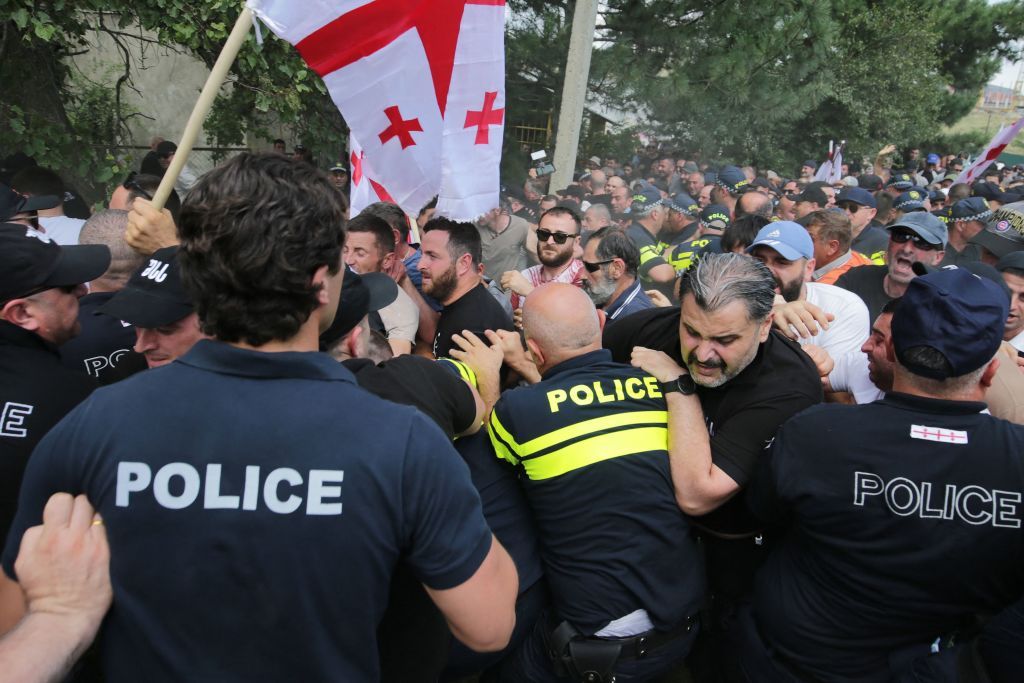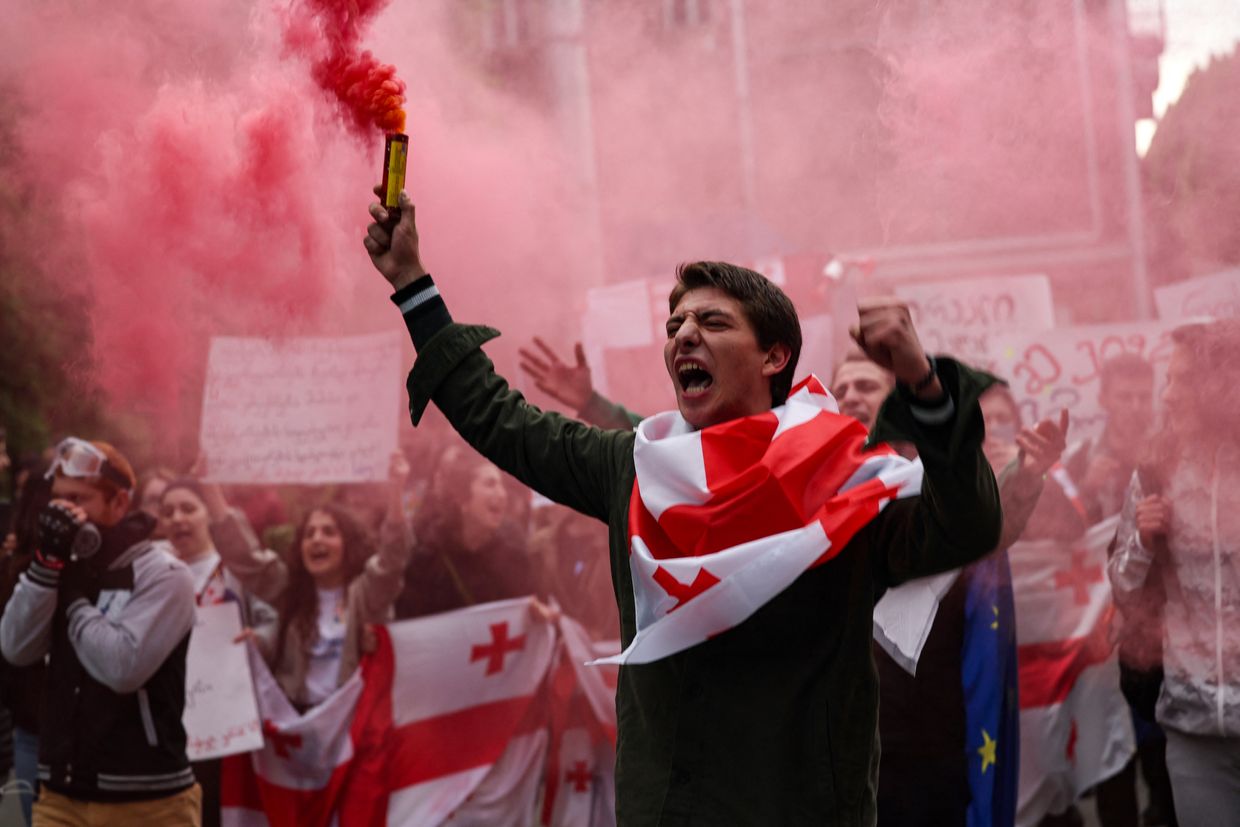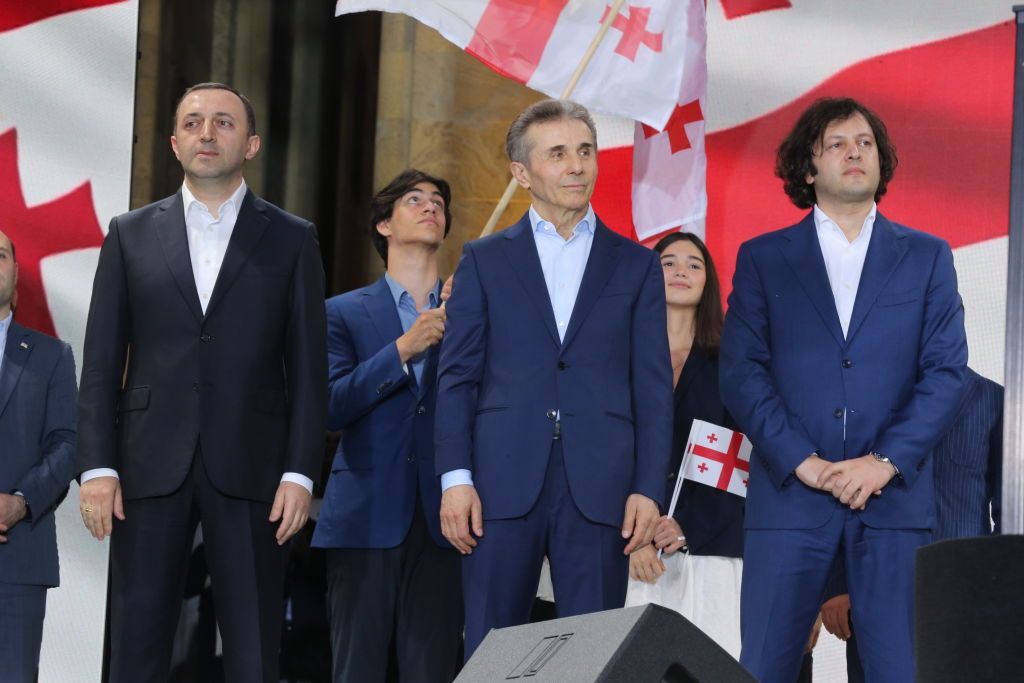Georgian leader's 'apology' for 2008 war could be a win for Russia, experts say
Controversial move by Moscow-friendly oligarch and de facto leader of Georgian Dream could backfire politically

Georgian Prime Minister Bidzina Ivanishvili after a bilateral meeting in the EU Commission headquarter in Brussels, Belgium on Nov. 12, 2012. (Thierry Tronnel/Corbis via Getty Images)
The de facto leader of the ruling Georgian Dream party stunned Georgians — who are rarely shocked by the turbulent political situation in the country — by declaring that Georgia should "apologize" for Russia's 2008 war against the country.
Oligarch Bidzina Ivanishvili's statement on Sept. 14 was a campaign promise made ahead of the upcoming October parliamentary election, and part of his party's larger trend of rapprochement with Russia.
But according to analysts who spoke to the Kyiv Independent, the suggestion that Georgia, rather than Russia, is at fault for the war may be a step too far and is unlikely to have a positive electoral impact for the Georgian Dream.
"This statement is not going to make the Georgian Dream any more popular with its constituents, those who already like them will vote for them no matter what, and those who are undecided, I think they will, for lack of a better term, be turned off by this statement," said Tinatin Japaridze, a risk analyst at the Eurasia Group.
"It's a lose-lose for Tbilisi, but a definite gain for Moscow because it is able to distance itself from taking responsibility for (the 2008 war)," Japaridze told the Kyiv Independent. The five-day war in 2008, which resulted in hundreds of deaths, the displacement of almost 130,000 people, and cemented the Russian occupation of around 20% of the country, has long been a hot-button political issue for Georgia.
"It's a lose-lose for Tbilisi, but a definite gain for Moscow."
While Ivanishvili's suggestion that Georgia should apologize to Ossetians, the minority ethnic group that predominantly lives in the South Ossetia region occupied by Russia, was the strongest statement to date, it was not the first time that Ivanishvili or other officials have blamed their own country for the Russian invasion of sovereign Georgian territory.
Russia's 2008 invasion of Georgia and its consequences
The roots of the 2008 Russian invasion of Georgia stretch back to Soviet times when an autonomous region for Ossetians was created after the Red Army took over Georgia in the 1920s and established communist rule. Across the border, in then Soviet Russia lay the North Ossetia autonomous region, where the bulk of ethnic Ossetians lived.
Following the collapse of the Soviet Union and the independence of Georgia, the majority of Ossetians were spread across the Russian North Ossetia, and the Georgian South Ossetia, now across an international border.
An ethnic conflict, inflamed and supported by Moscow, soon arose, resulting after the war's end in 1992 with divided control between Tbilisi and South Ossetian separatists in the region.
An unclear situation in South Ossetia remained in place until 2008 by which point Russia had given passports to a majority of the population.
Relations between the strongly pro-Western Georgian President Mikheil Saakashvili (2004-2013) and Russia had deteriorated. Moscow began further fanning the flames of separatism and claiming that Georgia was planning a genocide of Ossetians. Militant groups in South Ossetia began firing on Georgian positions, and ultimately, Saakashvili decided to send troops into the breakaway region.


In response, under the guise of protecting Ossetians, Russia sent its own military into the area, resulting in the five-day war and the subsequent Russian occupation of South Ossetia and Abkhazia, another region of Georgia where Russian-backed separatists had fought a war with Tbilisi in the 1990s.
During the war, Russian troops went far past the territories of Abkhazia and South Ossetia — both internationally recognized as sovereign Georgian territory — and drove armored columns just dozens of miles from Tbilisi.
According to the Georgian Foreign Ministry, 224 Georgian civilians and 161 soldiers were killed during the war.
The Blame Game
The war has been hotly debated across Georgia, Russia, and the West. Countless explanations have been given for how it started, who set it off, and who should be blamed.
A report by the Council of the European Union issued in 2009 claimed that Georgia was responsible for the war because it had set off hostilities through its shelling of the South Ossetian capital, Tskhinvali. The report said the Georgian attack was "unjustifiable" but also acknowledged that Russia went far beyond defending its own servicemen and Ossetian citizens and that the incursion past South Ossetia was "in violation of international law."
The report was criticized at the time for being overly deferential to Russia, a charge that has only increased since.
The European Council on Foreign Relations said in 2015 that the report had been influenced by Russian propaganda, and other think tanks like the Atlantic Council said that Russia was unequivocally to blame.
The European Court on Human Rights ruled in 2021 that Russia was responsible for a wide variety of human rights violations in the war.
The war has continued to be rethought and analyzed after Russia's military aggression against Ukraine, with many leaders and experts saying the international community's lack of proper response then gave the green light for Russia to later invade Ukraine.
But within Georgia, the war has become a political weapon, often employed by the Georgian Dream to smear Saakashvili – imprisoned since 2021 on charges he claims are trumped up by rivals – and his party, the United National Movement (UNM).

Ivanishvili and other officials have called Saakashvili and UNM "criminal" for starting the war, and have warned that their return to power (or any opposition party) would lead to renewed conflict with Russia.
"If one believes, like I do, that Ivanishvili has always been the Kremlin's instrument, with a task to bring Georgia back into Russian domination, then his current behavior can only be seen as the last steps of this plan," said David Zedelashvili, a constitutional lawyer and professor in Georgia.
In his statement about the need to apologize to Ossetians, Ivanishvili said: "Immediately after the Oct. 26 elections, those who instigated the war will face justice."
Tina Bokuchava, chair of UNM, said the remarks were "one of the most shameful, disgusting, treacherous statements," a sentiment that was echoed by other opposition politicians.
Prime Minister Irakli Kobakhidze said in August that the Georgian Dream would seek a constitutional ban of UNM and its affiliates if it secured a constitutional majority in the election. Many viewed the pledge as a plan to ban all opposition parties.
The 'poison pill' confederation
The wrangling over history is the latest step in Georgia's heated political environment as the country prepares for a decisive election in October.
In the meantime, Georgia's relations with the West have fallen to a low point, particularly over concerns about the controversial foreign agents law passed earlier in the year. The EU has frozen Georgia's path toward accession to the bloc, and both the EU and the U.S. have halted aid packages, citing fears of democratic backsliding in the country.
Some in Georgia believe that Ivanishvili's statement, given the wider context of warming relations with Moscow, is setting the stage for a possible deal with Russia that could see the reintegration of South Ossetia and Abkhazia into Georgia in the form of a confederation.

While Georgians across the board would be thrilled to see the return of the occupied territories, there is a widespread belief that such a plan as currently formulated would be a poison pill that ensures their reintegration on the Kremlin's terms.
"I think there's a lot of skepticism that Georgia can get the territories back anytime soon, whether it's under the opposition that may come to power or under the current ruling party," said Japaridze.
"It's a pie in the sky that the Georgian Dream is going to try to use."
The kind of concessions required to achieve reintegration with the consent of the Kremlin are unknown, and there are signs that Russian-backed authorities in South Ossetia and Abkhazia are not interested in such a deal.
"I don't think that Russia will even allow the project of confederation," Zedalishvili told the Kyiv Independent.
South Ossetian officials said the apology should be viewed in the context of domestic electoral politics, and added that "Tskhinvali expects not only verbal declarations but also practical steps" on key issues to move forward with any rapprochement.
The United National Movement (UNM) and Saakashvili are somewhat controversial in Georgia, opinion polls have found that a higher percentage of respondents said human rights abuses were the largest failure of the Saakashvili regime (27%). Failure to prevent the war came in second place, at 25%.
At the same time, a slight majority (55%) disagreed that the government did everything possible to stop the war from happening.

Numerous surveys have found that an overwhelming majority of Georgians still believe that Russia is the primary threat facing the country. Only 3% of respondents said they wanted a pro-Russia government, according to a 2023 poll. At the same time, a plurality of respondents, including those who support opposition parties, said that Georgia's foreign policy should be "pro-Western, however we should maintain good relations with Russia."
The Kremlin certainly wants to maintain influence over Georgia, but it does not hold political developments there to the same level of importance as in Ukraine, Japaridze said.
"As long as (the Kremlin's) interests are not being challenged, and ideally, they are being represented by whoever is in the Georgian government as the ruling party, Moscow is okay," Japaridze said.
"I don't think that they are going to necessarily try to invade Georgia or try to annex Georgia. "I don't think they need to do that, as long as it's within (the Kremlin's) fold," she added.












